最新高一英语必修一unit5知识点总结讲课教案
- 格式:pdf
- 大小:240.04 KB
- 文档页数:33
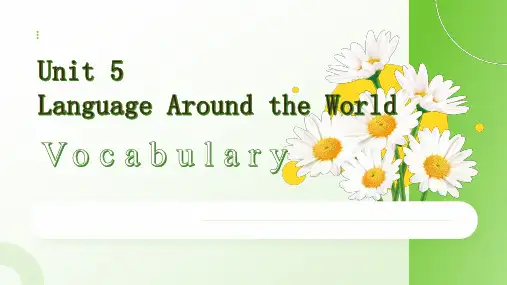
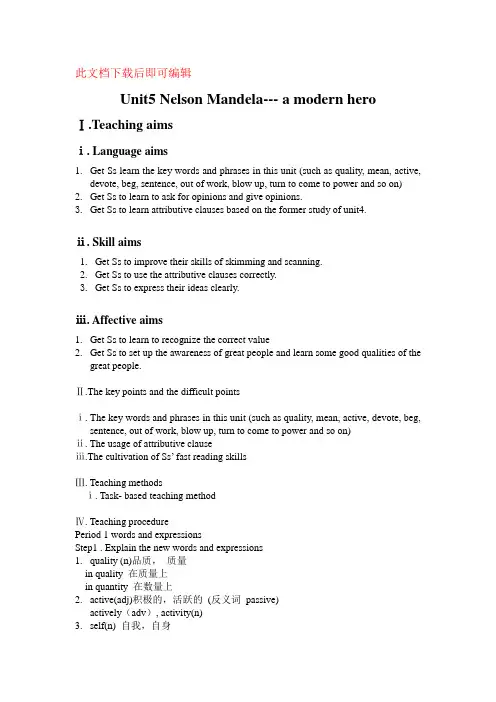
此文档下载后即可编辑Unit5 Nelson Mandela--- a modern heroⅠ.Teaching aimsⅰ. Language aims1.Get Ss learn the key words and phrases in this unit (such as quality, mean, active,devote, beg, sentence, out of work, blow up, turn to come to power and so on)2.Get Ss to learn to ask for opinions and give opinions.3.Get Ss to learn attributive clauses based on the former study of unit4.ⅱ. Skill aims1.Get Ss to improve their skills of skimming and scanning.2.Get Ss to use the attributive clauses correctly.3.Get Ss to express their ideas clearly.ⅲ. Affective aims1.Get Ss to learn to recognize the correct value2.Get Ss to set up the awareness of great people and learn some good qualities of thegreat people.Ⅱ.The key points and the difficult pointsⅰ. The key words and phrases in this unit (such as quality, mean, active, devote, beg, sentence, out of work, blow up, turn to come to power and so on)ⅱ. The usage of attributive clauseⅲ.The cultivation of Ss’ fast reading skillsⅢ. Teaching methodsⅰ. Task- based teaching methodⅣ. Teaching procedurePeriod 1 words and expressionsStep1 . Explain the new words and expressions1.quality (n)品质,质量in quality 在质量上in quantity 在数量上2.active(adj)积极的,活跃的(反义词passive)actively(adv), activity(n)3.self(n) 自我,自身selfish (adj)selfless(adj)selflessly(adv)4.devote(Vt) 献身,专心于devoted(adj) 忠实的,深爱的be devoted to doing sth.献身于…….be devoted to sth. 献身于……e.g. He devoted himself to his research for his whole life.5.out of work 失业out短语out of order 混乱,发生故障out of control 失去控制out of date 过时out of mind 心不在焉e.g. 1. She has been out of work since last month.2. The horse was out of control and ran away.6. vote.(Vt, Vi) 投票,选举vote for 投票赞成vote against 投票反对vote on 投票表决e.g. Most of us voted for her, so she was elected as chairman of Students’ Union.7. equal (adj) 相等的,平等的be equal with sb. 与某人平等be equal in sth. 在某方面平等8. turn to 求助于,致力于turn to sb. for help 向某人求助9. opinion (n)意见,看法,主张in one’s opinion/ view 在某人看来as far as I am concerned 就我而言step 2 HomeworkSs make sentences with the following phrases1.be devoted to doing sth.2.out of order3.be equal with sb.4.turn toPeriod 2 Warming up and pre-readingStep 1. Warming up1.Ss read and explain the Chinese meaning of the adjectives on page 33 by turn2.Ss discuss with their desk mates about the qualities that a great people has, andthen to stand up and give their own ideas.3.The T gives some comments on their performanceStep 2. Pre-readingThe T introduces the six famous people to Ss, and then Ss decide whether they are great people or not.Period 3 ReadingStep 1. Fast reading1.Ss read the passage and divide then whole passage into two parts(the T providesthem two choices and they match them ) in 15 minutes. After that, the whole class checks the answers together.Part1. Before Elias met Nelson MandelaPart 2. After Elias met Nelson Mandela2.Ss read the whole passage again and complete the multiple choice on theirworkbooks in 10 minutes and then ask 5 students to give their answers.Step 2. Language points1.1).Ss read the first paragraph together, and then the T explains the key languagepoints to Ss. After that, ask some students to translate some key sentences.2) Key points2. 1).Ss read the second paragraph together, and then the T explains the key language points to Ss. After that, ask some students to translate some key sentences.2) key points2.1).Ss read the third paragraph together, and then the T explains the key languagepoints to Ss. After that, ask some students to translate some key sentences.2) Key points3.1).Ss read the fourth paragraph together, and then the T explains the keylanguage points to Ss. After that, ask some students to translate some key sentences.2) key points4.1).Ss read the fifth paragraph together, and then the T explains the key languagepoints to Ss. After that, ask some students to translate some key sentences.2) key pointsStep 3 Post-readingSs complete the true or false exercise on page 35, then ask six students to give their own answers.Period 4 Using languageStep1. Lead inAsk Ss that do they want to know about the rest life of Elias and Nelson Mandela? Then bring out the topic of the reading passageStep 2. Pre-readingAsk Ss the following questions:1.Why could Elias get a job after get out of the prison?2.Why did Elias lose his job later?Ss read the passage and find the answers in 10 minutes.Step 2. Language points1.It was a prison from which no one escaped.escape( vi).escape与介词 from连用表示①逃脱;逃走:Eg.The soldier escaped from the enemy's prison.②(液体等)漏出E.g. Gas is escaping from the pipe. (Attention to the usage of prep.)cate (vt). 教育,培养,训练-----education n. 教育, 培养, 训练 educational adj. 教育的,受教育的3.reward n. 报酬;奖金vt. 给 ... 报酬,奖赏e.g.He got a reward for helping them.Step 3. ComprehensionSs complete the chart on page 39 in 5 minutes.Step 4. Conclusion and homework1.Ss retell the life of Elias according to the time line of this passage.2.Ss finish the exercise in the workbooks.Period 5 Grammar attributive clauseⅡStep 1. 关系副词when/where/why引导的定语从句-----当定语从句所修饰的先行词逻辑上在定语从句中做状语(表地点、时间、原因、方式等)时1.when 表示时间,做时间状语e.g. I’ll never forget the time when we worked on the farm.2.where表地点,引导地点状语从句e.g. The hotel where we stayed was very clean.3.why 表原因,其先行词一般是reason,在从句中在原因状语从句e.g. The reason why he was late was that he missed his train.4.关系副词通常可以用介词+ which替换when= at/ in / during/ on…+whichwhere= in/ at/ on…+whichwhy=for+whicheg. 1. the date when/on which we attended the meeting was June 18.2.Great changes are taking place in the city where/ in which we live.3.Is that the reason why / for which he was late for school?Step 2. 关系副词和关系代词的判断方法做状语,用关系副词或介词+ which做主语或宾语,用关系代词Eg. 1.I’ll never forgot the days when I played with you.3.The factory(that/ which) we visited yesterday was built last year.Step 3. 介词+which/whom引导的定语从句修饰物时--- which修饰人时---whomEg. 1.This is the room in which we lived last year.3.This is the person from whomn I borrowed the English novel.注意:1.含有介词的动词短语不能拆开,介词扔放在动词的后面。
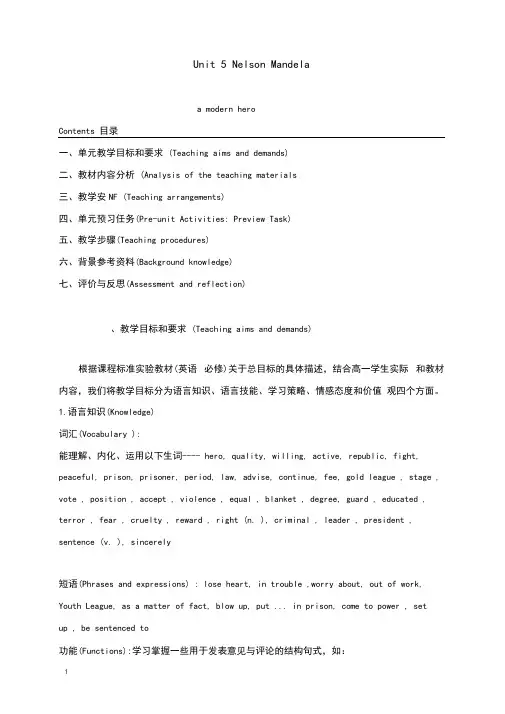
Unit 5 Nelson Mandelaa modern heroContents 目录一、单元教学目标和要求(Teaching aims and demands)二、教材内容分析 (Analysis of the teaching materials三、教学安NF (Teaching arrangements)四、单元预习任务(Pre-unit Activities: Preview Task)五、教学步骤(Teaching procedures)六、背景参考资料(Background knowledge)七、评价与反思(Assessment and reflection)、教学目标和要求(Teaching aims and demands)根据课程标准实验教材(英语必修)关于总目标的具体描述,结合高一学生实际和教材内容,我们将教学目标分为语言知识、语言技能、学习策略、情感态度和价值观四个方面。
1.语言知识(Knowledge)词汇(Vocabulary ):能理解、内化、运用以下生词---- hero, quality, willing, active, republic, fight, peaceful, prison, prisoner, period, law, advise, continue, fee, gold league , stage , vote , position , accept , violence , equal , blanket , degree, guard , educated , terror , fear , cruelty , reward , right (n. ), criminal , leader , president , sentence (v. ), sincerely短语(Phrases and expressions) : lose heart, in trouble ,worry about, out of work, Youth League, as a matter of fact, blow up, put ... in prison, come to power , setup , be sentenced to功能(Functions):学习掌握一些用于发表意见与评论的结构句式,如:1. 发表意见(Giving opinions )Why do you think so? What do you think of …? What's you opinion?agree / don't agree. I think / don't think .... I prefer .... In myopinion ....I'm afraid ....2.评论(Making comments)Good idea! That's an excellent idea .语法(Grammar):定语从句(II )(由where, when, why, 介词+ which, 介词+ whom引导的定语从句)The school where I studied only two years was three kilometres awayThis was a time when you had got to have a passbook to live in JohannesburgThe reason why I got a job was because of my hard work .•••we were put in a position in which we had either to accept we were less important, or fight the Government .The person to whomyou should be grateful for a peaceful South Africa is Nelson Mandela.扩展词汇:negative(消极的),heroine(女主角,女主人公),unwilling(不情愿的),nation(国家,民族),sacrifice(牺牲),realize (认识到),give up (放弃),riches (财富),Bible (圣经),revolution (革命),career (职业),equality (平等),fairness(公平),conflict (冲突),biography (自传),beliefs (信仰),Christianity (基督教),religion (宗教),priests (牧师),version (翻译),readable (易读的),adventure (冒险),scholar (学者),sympathy (同情),,campaign (从事活动),communist (共产主义者),injustice (不公平),oppose (反对),pilot(飞行员) , boycott (联合抵制)2.语言技能(Skills)听:在本单元的课文及练习册听力教学中,能听懂人物和事件以及它们的关系,能抓住所听语段中的关键词,正确理解话语间的逻辑关系。
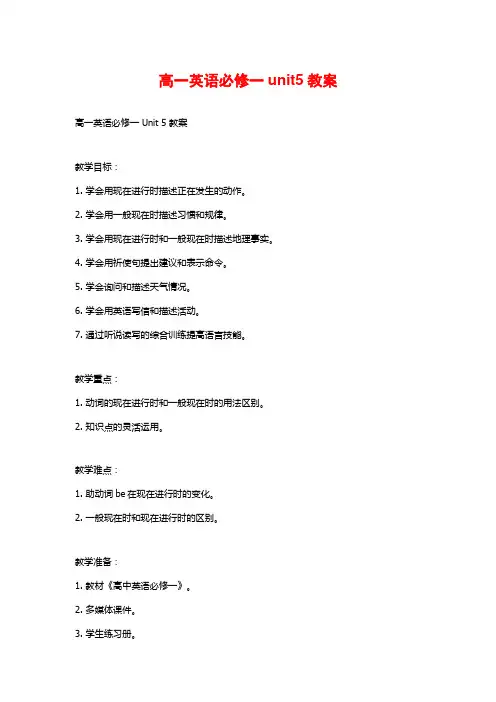
高一英语必修一unit5教案高一英语必修一 Unit 5 教案教学目标:1. 学会用现在进行时描述正在发生的动作。
2. 学会用一般现在时描述习惯和规律。
3. 学会用现在进行时和一般现在时描述地理事实。
4. 学会用祈使句提出建议和表示命令。
5. 学会询问和描述天气情况。
6. 学会用英语写信和描述活动。
7. 通过听说读写的综合训练提高语言技能。
教学重点:1. 动词的现在进行时和一般现在时的用法区别。
2. 知识点的灵活运用。
教学难点:1. 助动词be在现在进行时的变化。
2. 一般现在时和现在进行时的区别。
教学准备:1. 教材《高中英语必修一》。
2. 多媒体课件。
3. 学生练习册。
教学过程:Step 1:导入新课(5分钟)教师通过图片或实物引入新课,让学生猜测图片或实物所代表的词汇,并引导学生运用现在进行时进行描述。
Step 2:新课讲解(10分钟)通过多媒体课件,教师讲解现在进行时的基本构成和用法,并与一般现在时进行对比。
教师需要注意解释助动词be在现在进行时中的变化形式。
Step 3:练习(15分钟)1. 学生通过练习册完成现在进行时的练习题,巩固所学内容。
2. 学生通过小组活动,互相用现在进行时描述图片或实物,提高他们的口语表达能力。
Step 4:教师示范(10分钟)教师通过多媒体课件展示一些图片或实物,并运用一般现在时句型进行描述。
同时,教师将一般现在时和现在进行时进行对比,让学生理解两者的区别。
Step 5:练习(15分钟)学生通过练习册完成一般现在时的练习题,巩固所学内容。
学生也可以在小组活动中互相提问和回答,以增加口语训练的机会。
Step 6:拓展(10分钟)教师通过多媒体展示世界地图,引导学生提问和回答关于国家的位置、人口和面积等问题,并运用现在进行时和一般现在时进行描述。
Step 7:练习(15分钟)学生通过练习册完成地理事实相关的练习题,巩固所学内容。
同时,学生也可以在小组活动中进行口语训练,提高语言表达能力。
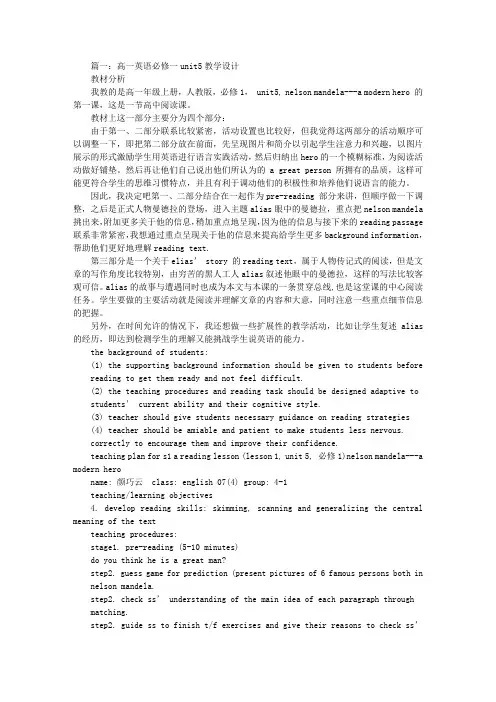
篇一:高一英语必修一unit5教学设计教材分析我教的是高一年级上册,人教版,必修1, unit5, nelson mandela---a modern hero 的第一课,这是一节高中阅读课。
教材上这一部分主要分为四个部分:由于第一、二部分联系比较紧密,活动设置也比较好,但我觉得这两部分的活动顺序可以调整一下,即把第二部分放在前面,先呈现图片和简介以引起学生注意力和兴趣,以图片展示的形式激励学生用英语进行语言实践活动,然后归纳出hero的一个模糊标准,为阅读活动做好铺垫。
然后再让他们自己说出他们所认为的a great person 所拥有的品质,这样可能更符合学生的思维习惯特点,并且有利于调动他们的积极性和培养他们说语言的能力。
因此,我决定吧第一、二部分结合在一起作为pre-reading 部分来讲,但顺序做一下调整,之后是正式人物曼德拉的登场,进入主题alias眼中的曼德拉,重点把nelson mandela 挑出来,附加更多关于他的信息,稍加重点地呈现,因为他的信息与接下来的reading passage 联系非常紧密,我想通过重点呈现关于他的信息来提高给学生更多background information,帮助他们更好地理解reading text.第三部分是一个关于elias’ story 的reading text,属于人物传记式的阅读,但是文章的写作角度比较特别,由穷苦的黑人工人alias叙述他眼中的曼德拉,这样的写法比较客观可信。
alias的故事与遭遇同时也成为本文与本课的一条贯穿总线,也是这堂课的中心阅读任务。
学生要做的主要活动就是阅读并理解文章的内容和大意,同时注意一些重点细节信息的把握。
另外,在时间允许的情况下,我还想做一些扩展性的教学活动,比如让学生复述alias 的经历,即达到检测学生的理解又能挑战学生说英语的能力。
the background of students:(1) the supporting background information should be given to students before reading to get them ready and not feel difficult.(2) the teaching procedures and reading task should be designed adaptive to students’ current ability and their cognitive style.(3) teacher should give students necessary guidance on reading strategies(4) teacher should be amiable and patient to make students less nervous.correctly to encourage them and improve their confidence.teaching plan for s1 a reading lesson (lesson 1, unit 5, 必修1)nelson mandela---a modern heroname: 颜巧云 class: english 07(4) group: 4-1teaching/learning objectives4. develop reading skills: skimming, scanning and generalizing the central meaning of the textteaching procedures:stage1. pre-reading (5-10 minutes)do you think he is a great man?step2. guess game for prediction (present pictures of 6 famous persons both in nelson mandela.step2. check ss’ understanding of the main idea of each paragraph through matching.step2. guide ss to finish t/f exercises and give their reasons to check ss’understanding of specific information.information and train their independent thinking and judgment, and help to enhance their ability to organize their ideas logically.people equal?e.g. 1940: born1946: six, educated, 2 years1948: leave school, could not pay fee……….stage3. post-reading (10-15 minutes)step2. listen to the tape and read the quotes from nelson mandela to help ss feel the passion and the firm faith of the great man.step3. guide ss to summarize and explore the implied meaning of the text---a great man need not to be famous, he / she must have some good qualities and devote themselves to helping others.(1) ss try to summarize the language points by themselvespart of verbatim plan for lesson1, unit5, s1a, 必修1-----nelson mandela- a modern herot: (after greeting ss)ss: (some ss may give their opinions)t: do you think he is a great man?ss: yes/no.ss: yes/ no.ss: (get into brainstorming)…t: ok, class, have you finished it?ss: yes.篇二:人教版高中英语必修一 unit 5教案unit 5 nelson mandela——a modern hero教材分析:本单元以 nelson mandela —— a modern hero 为话题,目的在于使学生了解一个伟大的人应具备怎样的品质,学会表达自己的观点,并用所学的句型来描写一个伟人。

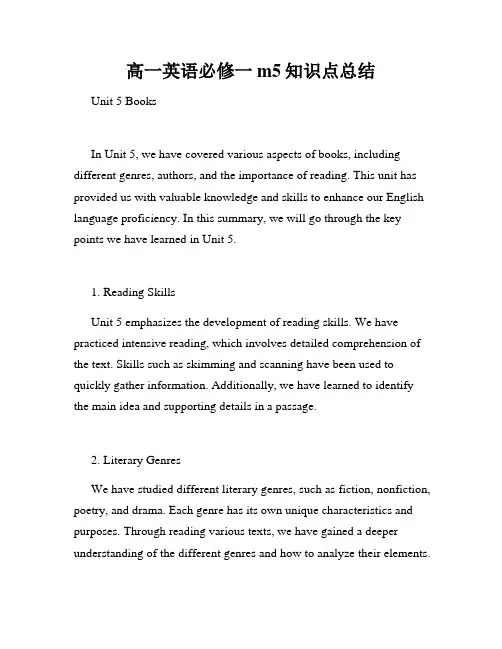
高一英语必修一m5知识点总结Unit 5 BooksIn Unit 5, we have covered various aspects of books, including different genres, authors, and the importance of reading. This unit has provided us with valuable knowledge and skills to enhance our English language proficiency. In this summary, we will go through the key points we have learned in Unit 5.1. Reading SkillsUnit 5 emphasizes the development of reading skills. We have practiced intensive reading, which involves detailed comprehension of the text. Skills such as skimming and scanning have been used to quickly gather information. Additionally, we have learned to identify the main idea and supporting details in a passage.2. Literary GenresWe have studied different literary genres, such as fiction, nonfiction, poetry, and drama. Each genre has its own unique characteristics and purposes. Through reading various texts, we have gained a deeper understanding of the different genres and how to analyze their elements.3. Elements of FictionUnit 5 has introduced us to the elements of fiction, including plot, character, setting, theme, and point of view. We have learned how these elements contribute to the overall meaning and structure of a story. By analyzing these elements, we can interpret the author's intentions and appreciate the literary work.4. Author Study: William ShakespeareAn important part of this unit is the study of William Shakespeare, one of the greatest playwrights in history. We have explored some of his famous plays, such as Romeo and Juliet and Macbeth, and gained insight into his writing style and themes. Shakespeare's works have not only entertained us but also provided profound insights into human nature.5. Idioms and ExpressionsThroughout Unit 5, we have come across various idioms and expressions related to books and reading. These idioms add color and depth to the language. By understanding their meanings and usage, we can enhance our language skills and express ourselves more effectively.6. Importance of ReadingFinally, Unit 5 has emphasized the importance of reading. By reading extensively, we can broaden our horizons, improve our language skills, and develop critical thinking. Reading also allows us to explore different cultures and perspectives, leading to personal growth and a deeper understanding of the world.In conclusion, Unit 5 has provided us with a comprehensive understanding of books, genres, and the importance of reading. By developing our reading skills and analyzing various literary elements, we have enhanced our language proficiency and critical thinking abilities. Moreover, the study of William Shakespeare and exposure to idioms and expressions have enriched our knowledge of the English language. Let us continue to explore the world of books and enjoy the pleasures of reading.。
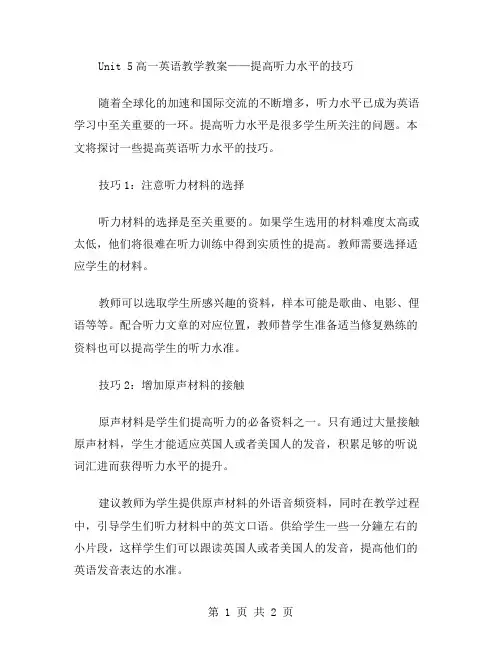
Unit 5高一英语教学教案——提高听力水平的技巧随着全球化的加速和国际交流的不断增多,听力水平已成为英语学习中至关重要的一环。
提高听力水平是很多学生所关注的问题。
本文将探讨一些提高英语听力水平的技巧。
技巧1:注意听力材料的选择听力材料的选择是至关重要的。
如果学生选用的材料难度太高或太低,他们将很难在听力训练中得到实质性的提高。
教师需要选择适应学生的材料。
教师可以选取学生所感兴趣的资料,样本可能是歌曲、电影、俚语等等。
配合听力文章的对应位置,教师替学生准备适当修复熟练的资料也可以提高学生的听力水准。
技巧2:增加原声材料的接触原声材料是学生们提高听力的必备资料之一。
只有通过大量接触原声材料,学生才能适应英国人或者美国人的发音,积累足够的听说词汇进而获得听力水平的提升。
建议教师为学生提供原声材料的外语音频资料,同时在教学过程中,引导学生们听力材料中的英文口语。
供给学生一些一分鐘左右的小片段,这样学生们可以跟读英国人或者美国人的发音,提高他们的英语发音表达的水准。
技巧3:注重英式音标的掌握英式音标是英语学习过程中的必要知识。
掌握英式音标可以帮助学生们更好地辨识英国人或美国人口音的发音,通过对英式音标的了解,学生能更加认识到英语口语的特点。
学生们需要学会听取英式音标来辨认听力资料中的词语,教师需要引导学生阅读英文文章,标出发音不正確的词汇,注重通过口语进行发音的矫正。
技巧4:尝试不同的听力练习方法有时候听力水平的提高并不一定是通过固定的听力测验来完成的。
尝试使用不同的听力练习方式,例如未整理的听力材料、简方便的半整理了的文本等,这可以帮助学生们在听力方面获取更多的经验。
教师还可以设计一些听力游戏或者竞争活动。
例如,游戏或竞赛可以涵盖对话的分类、一些重要的细节等,使学生们更有兴趣地参加教学活动,从而在不断的练习中提高听力水平。
在学习英语听力过程中,学生们不仅需要提高自己的听力技能,还需要通过各种方法来消化更多的视、听素材,将语言的一切元素以及文化理解在听力训练和英语学习中更好的发挥。
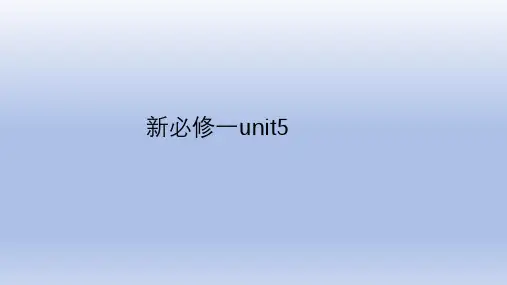

高一英语必修一unit5教案高一英语必修一unit5教案1(一) 教材地位和教学内容分析本课是高一必修模块1第4单元的阅读课型,这单元围绕earthquakes这一主题开展听、说、读、写多种教学活动。
Reading设计为本单元的第2课时。
本课型是单元整体教学的重要环节,为学生的语言学习、语法学习提供了载体,并且是学生获取信息的主要来源。
“Reading―――A NIGHT THE EARTH DIDN’T SLEEP”具体描写1976年唐山大地震的震前、震中和震后。
本篇文章词汇量大,运用了大量的动词、复杂的数字,出现许多定语从句,篇幅较长,并且采用一些修辞手法,对学生的语言阅读能力提出了更高的要求。
但文章的结构较明显,较容易归纳出各部分的中心词。
(二)教学目标1. 语言知识目标:a)使学生了解自然灾害的相关词汇,并掌握复杂数字的表达法。
b)学习掌握与地震相关的词汇,如:shake,well,rise,smelly,pond,pipe,burst,canal,steam,ruin,injure,destro y,brick,dam,useless,steel,shock,quake,rescue,electricity,disaster,arm y,organize,bury,coal,mine,shelter,fresh,percent等,以及right away, at an end, dig out, give out, thousands of以及一些优美句子的赏析。
2. 语言技能目标:a)阅读技能的训练:让学生学会克服生词障碍,通过略读,归纳出文章的大意;通过细读,理清文章的总体框架与脉络,归纳出各部分的中心词;通过查读,捕捉文章的重要细节,培养学生获取、处理信息的能力。
b) 让学生复述课文,分析、感悟作者的写作意图。
c) 让学生运用本节课所学词汇、知识,通过采访唐山大地震幸存者的形式进行小组活动,提高学生用英语进行创造性交流的能力。
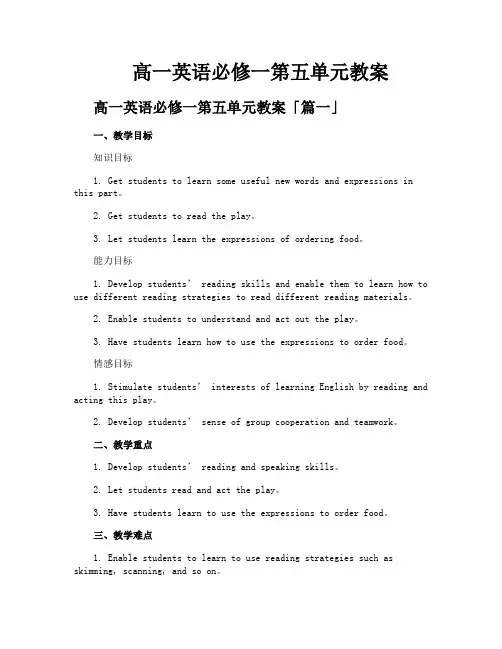
高一英语必修一第五单元教案高一英语必修一第五单元教案「篇一」一、教学目标知识目标1. Get students to learn some useful new words and expressions in this part。
2. Get students to read the play。
3. Let students learn the expressions of ordering food。
能力目标1. Develop students’ reading skills and enable them to learn how to use different reading strategies to read different reading materials。
2. Enable students to understand and act out the play。
3. Have students learn how to use the expressions to order food。
情感目标1. Stimulate students’ interests of learning English by reading and acting this play。
2. Develop students’ sense of group cooperation and teamwork。
二、教学重点1. Develop students’ reading and speaking skills。
2. Let students read and act the play。
3. Have students learn to use the expressions to order food。
三、教学难点1. Enable students to learn to use reading strategies such as skimming, scanning, and so on。
必修一unit5英语说课稿在准备英语说课稿的过程中,教师需要考虑课程的目标、内容、教学方法、学生特点以及评估方式等多个方面。
以下是一份针对必修一Unit 5的英语说课稿示例:课程名称:必修一Unit 5教学目标:1. 学生能够理解并掌握本单元的核心词汇和短语。
2. 学生能够运用本单元的语法结构进行基本的英语交流。
3. 学生能够通过阅读和听力练习,提高英语语言的综合运用能力。
4. 培养学生的跨文化交际意识和批判性思维能力。
教学内容:1. 词汇:本单元将重点学习与日常生活相关的词汇,例如食物、服装、交通等。
2. 语法:本单元的语法点包括一般现在时、现在进行时的使用。
3. 阅读:选取与主题相关的短文,提高学生的阅读理解能力。
4. 听力:通过听力材料,训练学生捕捉关键信息和理解主旨大意的能力。
5. 口语:通过角色扮演、小组讨论等形式,锻炼学生的口语表达能力。
教学方法:1. 互动式教学:鼓励学生参与课堂讨论,提高课堂的互动性。
2. 任务型学习:设计任务型活动,让学生在完成任务的过程中学习语言。
3. 多媒体教学:利用多媒体资源,如视频、音频等,丰富教学内容,提高学生的学习兴趣。
学生特点:1. 学生对英语有基本的了解和兴趣。
2. 学生可能对某些语法点存在理解上的困难。
3. 学生的英语口语表达能力有待提高。
教学过程:1. 导入(Lead-in):通过图片、视频等激发学生兴趣,引入主题。
2. 呈现(Presentation):清晰展示新词汇和语法结构,确保学生理解。
3. 练习(Practice):通过填空、转换句型等练习,巩固学生对新知识的掌握。
4. 应用(Application):设计情景对话、角色扮演等活动,让学生将所学知识运用到实际交流中。
5. 产出(Production):通过小组讨论、演讲等形式,检验学生的语言运用能力。
6. 总结(Summary):回顾本节课的重点内容,确保学生对知识点有清晰的认识。
评估方式:1. 课堂参与度:观察学生在课堂上的互动和参与情况。
教学目标:1.让学生掌握本单元的核心词汇、短语和句型。
2.培养学生的阅读理解能力和口语表达能力。
3.帮助学生了解中西方文化差异,提高跨文化交际能力。
教学重难点:1.词汇:determine,achieve,inaddition,municate,cultureshock等。
2.句型:Itis+adj.for(of)sbtodosth;sbbedeterminedtodosth。
3.语法:一般现在时、一般过去时和一般将来时的运用。
教学过程:一、导入1.利用多媒体展示本单元的主题图片,引导学生谈论图片中的内容,激活学生的思维。
2.提问:你们认为文化差异对人际交往有什么影响?二、知识点讲解1.词汇讲解(1)determine:v.决定,确定e.g.Hisattitudedeterminedhissuccess.(2)achieve:v.实现,达到e.g.Theyachievedtheirgoalshardwork.(3)inaddition:e.g.InadditiontoEnglish,healsospeaksFrench.(4)municate:v.沟通,交流e.g.Weshouldlearntomunicatewithotherseffectively.(5)cultureshock:文化冲击e.g.HeexperiencedcultureshockwhenhefirstwenttotheUnitedS tates.2.句型讲解(1)Itis+adj.for(of)sbtodosth:对某人来说做某事是……的e.g.ItisimportantforustolearnEnglishwell.(2)sbbedeterminedtodosth:某人决心做某事e.g.Theyaredeterminedtowinthegame.3.语法讲解(1)一般现在时:表示现在的事实、状态或习惯。
e.g.Hegoestoschooleveryday.(2)一般过去时:表示过去的事实。
高一英语必修一第五单元教案前言高一英语必修一第五单元主要是讲解情态动词和被动语态的用法。
本教案旨在帮助教师在教学过程中更好地掌握教材内容,提高教学效果。
教学目标1.学生能够正确使用情态动词can, could, may,might和should等。
2.学生掌握被动语态的用法及与主动语态的区别。
3.学生能够正确使用现在进行时的被动语态和一般过去时的被动语态。
4.学生能够正确运用所学内容写出简单的应用文。
教学重点1.情态动词的用法。
2.被动语态的用法及其与主动语态的区别。
教学难点1.情态动词的运用。
2.被动语态的使用。
教学方法1.演讲式教学:在教师的讲解下,学生了解各种语法规则和句子结构的特点及其应用。
2.演示式教学:在实例的帮助下,学生更好地掌握所学内容并提高应用能力。
教学内容及安排本单元教学内容分为四部分:情态动词的用法、被动语态的用法与主动语态的比较、现在进行时的被动语态和一般过去时的被动语态的用法。
教学安排如下:第一课时:情态动词的用法1.情态动词can和could的区别与用法。
–辨析can和could在一般现在时、一般过去时和将来时的用法。
–对比can和could的语气:表示请求、给予建议、表达能力、询问能力等。
2.情态动词may和might的区别与用法。
–对比may和might的语气:表示可能性、推测、请求允许和给予同意等。
3.情态动词should的用法。
–表示应该做的事情、提出建议、发出命令等。
第二课时:被动语态的用法与主动语态的比较1.被动语态的定义及常见结构。
–句子中的谓语动词使用被动语态时要用助动词be。
–时间状语和地点状语的固定位置问题。
2.被动语态与主动语态的区别。
–将被动语态作为主语,用主动语态表示同一意思的一个对比练习,帮助学生明确被动语态的意义并运用。
第三课时:现在进行时的被动语态1.现在进行时的被动语态的构成。
–here和now的替换。
–主语使用第三人称单数。
2.现在进行时的被动语态的用法。
高一英语必修一第五单元教案精选5篇高一英语必修一第五单元教案【篇1】第一部分:热身快速应答:1.How are you going to school everyday?2.Thank you very much for your help.3.Would mind my opening the window?4.What day was it yesterday?5.What's the weather like today?第二部分:朗读口语朗读技巧:1.声调与降调I have three English books, two Chinese dictionaries and five pens. Do you havea map in your hand? Yes, I do.2.连读:将前一个单词最后的辅音与后一个单词开头的元音连在一起朗读。
half an hour ran out of not at all3.失爆:当相邻两个爆破音在一起时,往往给前面一个爆破音留一个位置,但不爆破,稍停随即发后面的爆破音,这种现象称为“失爆”。
hot bath the next day a good deal of I don’t believe I don’t know I want to say朗读练习:1. A smart housewife was told that there was a kind of stove which would only consume half of the coal she was burning. She was very excited, and said: That'll be terrific! Since one stove can save half of the coal, if I buy two, no coal will be needed!2.The little boy did not like the look of the barking dog.It's all right, said a gentleman, don't be afraid. Don't you know the proverb: Barking dogs don't bite?Ah, yes, answered the little boy. I know the proverb, but does the dog knowthe proverb, too?高一英语必修一第五单元教案【篇2】一、教材分析:本课是结合人教版高中英语教材选修5中有关过去分词的语法内容,进行过去分词的学习,教学中将语法知识的传授和语言基本技能的学习结合到一起,注重复习语法与语言的运用。
高一英语必修一unit5教案教案名称:Unit 5: Meeting Your New Classmates教学目标:1. 通过学习本单元,学生将能够运用描述人物特征和外貌的词汇,并能够进行简单的自我介绍。
2. 学生将能够在日常生活中运用所学的词汇和句型进行交流,并能够发展有效的交际能力。
3. 学生将培养对他人的关心和尊重,增强团队合作意识。
教学重点:1. 掌握描述人物特征和外貌的词汇。
2. 学会运用目标语言进行简单的自我介绍。
3. 发展有效的交际能力。
教学难点:1. 学生能够使用目标语言进行简单的自我介绍。
2. 学生能够在日常生活中运用所学的词汇和句型进行交流。
教学准备:教材:高中英语必修一(人教版)第五单元的教科书、课后习题、配套教学光盘等。
辅助教具:录音机、多媒体设备、图片、班级展示板等。
教学过程:Step 1: Warm-up (5 minutes)1. Greetings: Greet the students and ask them how they are doing.2. Show pictures of people with different appearances (such as tall, short, fat, thin, etc.) and ask students to describe their appearances.3. Ask students to introduce themselves to their classmates briefly.Step 2: Presentation and Practice (25 minutes)1. Introduce new vocabulary related to physical appearance and personality traits, such as tall, short, fat, thin, funny, serious, etc. Use pictures and gestures to help students understand and remember the words.2. Play the audio files to help students practice pronouncing the new words.3. Ask students to work in pairs and describe their partners using the new vocabulary. For example, \。
高一英语必修一u5教案和说课稿Title: Lesson Plan and Teaching Script for Grade 10 English Compulsory Unit 5。
Lesson Plan for Grade 10 English Compulsory Unit 5。
I. Objectives。
By the end of the lesson, students will be able to:1. Understand the key vocabulary and phrases related to the topic of the environment.2. Comprehend the main ideas and details of the reading passage.3. Discuss the environmental issues and express their own opinions in English.4. Write a short paragraph expressing their views on environmental protection.II. Materials。
1. Textbook: Grade 10 English Compulsory Unit 5。
2. Handouts: Vocabulary list, Reading passage, Discussion questions。
3. Whiteboard and markers。
III. Procedure。
1. Warm-up (10 minutes)。
Greet the students and have a brief discussion about the environment.Show a short video or images related to environmental issues to stimulate students' interest.2. Vocabulary and Phrases (15 minutes)。
2015年高一英语必修一unit5知识点总结发布时间:2015-01-31在高中英语学习的过程中,所学的东西非常多且零散,同学们要学好所学的知识,必须要对所学的知识进行知识点的总结,下面是小编为帮助大家节省高一英语学习总结的时间,特意整理的2015年高一英语必修一unit5知识点总结。
1. A great person is a someone who devotes his/her life to helping others.伟人是把自己的生命奉献给帮助别人的人。
(He started to study ecology and decided to devote his whole life to thescience.他开始研究生态学,并决心将他的一生献身于这门科学。
He devoted himself entirely to music.他将一生奉献给了音乐。
)2. fight against 对抗,反对,与……作斗争We are all brothers in the same fight against injustice.在共同反对非正义行为的斗争中, 我们都是同志.People often have to fight for their liberty.人们往往不得不为自由而战。
He and his wife are always fighting about who will take after the children.他与他妻子总是在为由谁来照看孩子而吵架。
3. He worked selflessly in China as a doctor and saved many Chinesesoldiers. 作为一个医生他无私地在中国工作,并且拯救了很多中国战士。
4. He strongly believed in the three principles: nationalism; people’s rights; people’s livelihood. 他主张三民主义:民主、民权、民生。
5. be free from 免于,不受A judge must be free from prejudice.法官必须不抱成见。
6. in a peaceful way 以和平的方式7. be in prison 入狱,在狱中服刑in the prison 在监狱8. the same…as…和……一样9. the first man to land on the moon 第一个登上月球的人10. The time when I first met him was a very difficult period of my life. 第一次见到他的时候是在我一生中非常艰难的时期。
(定语从句)11. He was generous with his time,for which I was grateful.他十分慷慨地给予我时间,我为此非常感激。
(He is generous with his money.他花钱大方。
I am grateful to you for helping me.感谢你的帮助。
Our grateful thanks are dueto you.我们衷心感谢你。
)12. have little education 受的教育少13. I could not read or write well. 我既不会读也不会写。
14. I worried about whether I would become out of work. 我担心我是不是会失业。
15. I became more hopeful about my future. 我对自己的未来充满了希望。
(I am hopeful that she will come tomorrow. 我对她明天要来抱着希望。
)16. as soon as I could 尽快,马上17. The last thirty years have seen the greatest number of laws stoppingour rights and progress, until today we have reached a stage where we havealmost no rights at all. (定语从句) 过去30年来所出现的大量法律剥夺我们的权利,阻挡我们的进步,一直到今天,我们还处在几乎什么权利都没有的阶段。
(The 19th century saw many changes. 许多变革发生于19世纪。
at an early stage in our history在我们的历史早期)18. …we were put into a position in which we had either to accept we wereless important, or fight the government. 我们被置于这样一个境地:要么我们被迫接受低人一等的现实,要么跟政府作斗争。
19. Only then did we decide to answer violence with violence. 只有到这个时候,我们才决定用暴力反抗暴力。
(Only 位于句首,修饰副词、介词短语或状语从句时,句子采用部分倒装的语序;修饰状语从句时,只有主句采用部分倒装的语序。
如:① Only in this way can you come up with a solution to the problem.只有这样,你才能想出解决这个问题的办法。
② Only after being asked three times did he come to the meeting.叫了三次他才来参加会议。
③ Only when he is seriously ill does he ever stay in bed.病的很重时,他才卧床休息。
Only then did I realize my mistake. 直到那时我才知道我的错误.)20. as a matter of fact 事实上(As a matter of fact,it is health that counts.事实上,健康才是最重要的。
As a matter of fact, parents don’t want their children to be in trouble. 事实上,父母都不希望子女有麻烦。
)21. In 1963, I helped him blow up some government buildings.在1963年,我帮助他炸毁了一些政府大楼。
(Can you lend me a pump toblow up my bicycle tyres?你能借给我个打气筒给车胎打打气吗?Then it turned out that some stars, like our own sun will blow up one day.然后,事实上有些恒星,就像我们自己的太阳,有朝一日会爆炸。
)22. …I knew it would help us achieve our dream of making black and white我知道这是为了实现我们的黑人和白人平等的梦想。
people equal. ……23. in trouble 处于困境遇到麻烦Do as you're told, otherwise you'll be in trouble.叫你怎么做就怎么做, 否则有麻烦.24. be willing to do sth. 愿意,乐于Only very few people would be willingto share with him their opinions.很少有人愿意跟他分享他们的见解。
25. What was his attitude towards the unfair situation black people faced?他对黑人面临的不公平处境什么态度?26. turn to 变成;求助于,借助于, 翻到,转向She had no one to turn to for advice.她没有一个可以商量的人。
Who can I turn to in my hour of need? 在我需要的时候我能向谁求助呢?As they were out of work, Mr and Mrs Black had to turn to their relatives for help.布莱克夫妇由于失业,不得不向亲戚求帮助。
27. … the quality of life for black people got worse. …… 黑人的生活质量更糟糕。
28….many people remember me as one of the first active black fighters forhuman rights 很多人认为我是为人权而战的第一批积极的黑人战士之一。
29. lose heart 灰心;泄气, 丧失勇气,失去信心Difficulties were increasing. Even then we did not lose heart. 尽管困难在增加,但我们毫不灰心。
You will succeed sooner or later while you don't lose heart.只要你不失去信心,你迟早会成功。
If you fail, you should not lose heart but just keep on going. 如果你失败了,你也不该灰心。
30. escape from 逃脱,逃离,从……逃出He listens to music as an escape from the pressures of work.他听音乐以缓解一下工作的压力.He stayed in the background to escape from the public attention. 他呆在幕后为了避开公众的注意。
The couple had a narrow escape from the fire.这对夫妻从火灾中死里逃生。
31. He taught us during the lunch breaks and the evenings when we shouldhave been asleep. 在午餐的休息时间和晚上我们本应该睡觉的时候他教授我们。